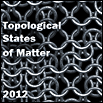Speaker
Wouter BEUGELING
(Utrecht University)
Description
Topological states of matter are characterised by a
topological invariant, which is protected against disorder
effects. In two-dimensional systems, a perpendicular
magnetic field can induce the quantum Hall effect, where
the Hall conductivity is quantised and protected because it is
carried by chiral edge currents. Systems with large spin-
orbit coupling in absence of a magnetic field exhibit the
quantum spin Hall effect, where the protected quantity is
the spin Hall conductivity, carried by helical edge states.
In this talk, I address the combined effect of a magnetic
field and spin-orbit coupling within a tight-binding model of
electrons in a honeycomb lattice. First, I will explore the
effects of the intrinsic and Rashba spin-orbit and Zeeman
terms individually. Secondly, I will discuss the subtle
competitions that arise if these terms are combined. In
particular, I will discuss the topological phase transitions
induced by variation of the intrinsic spin-orbit coupling. I will
conclude by exploring the candidates for experimental
realisation of this model: Graphene, artificial honeycomb
lattices, and cold atoms in optical lattices.
References:
* N. Goldman, W. Beugeling, and C. Morais Smith, EPL 97,
23003 (2012).
* W. Beugeling, N. Goldman, and C. Morais Smith,
arXiv:1204.2212.

